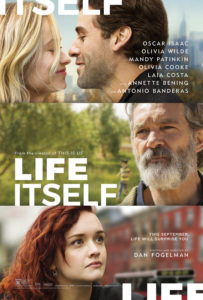

LIFE ITSELF
Directed by: Dan Fogelman
Written by: Dan Fogelman
Starring: Oscar Issac, Olivia Wilde, Annette Bening, Olivia Cooke, Mandy Patinkin, Antonio Banderas, Sergio Peris-Mencheta, Laia Costa, Alex Monner, Samuel L. Jackson
Review by Mia Santos
I’ll be completely honest here. When I came out of Life Itself, my eyes were so puffy and red from crying. It looked like someone had kidnapped my beloved cat and left me a ransom note with rules I would not be able to complete in time for his faithful return. I had volunteered for the Toronto International Film Festival a week prior. As a perk for the returning volunteers, they had an advance screening of this film.
This was my first year volunteering, so I didn’t get invited to the screening, but many who did had said they loved the film! From the trailer I had seen and an A-list cast including Oscar Issac, Annette Bening, Antonio Banderas, and Olivia Wilde, I wasn’t surprised! We’re also talking about writer/director Dan Fogelman. The same man who brought us This Is Us. A show that makes me sob every episode. EVERY EPISODE!
With all this after screening it this week, I felt justified in my enjoyment of it. But that feeling was quickly shot down when I saw that just about every other critic I follow absolutely hated it. “Emotionally manipulative” and “overtly contrived” were some of the most heard complaints in many of the reviews I read. I really had to dig to find the critics who felt the same as me! Here goes my take, very different to what you will read elsewhere.
This film begins with a narrator, Samuel L. Jackson to be exact. He sets a comedic mood in a psychiatrist’s office where we meet a man who obsesses over Fantasy Football to suppress his eating disorder. We learn his psychiatrist is Dr. Morris (played by Annette Bening), who after the session goes out for a smoke and walks down the street where she meets eyes with Will (Oscar Issac). The moment is brief but sweet until Will calls out to her while she crosses the street “Big fan!” At this moment, without fully ruining the scene for you we’re quickly reminded this isn’t a rom-com at all but a fictional drama where tears will be shed and deeper, tougher topics will be touched upon. The narrator also changes to an unknown woman’s voice going forward.
I will say this, Life Itself is a little ambitious in both stories and characters. He’s unpacking a lot in 1 hour and 58 minutes. The film is told in chapters. Each one gives us glimpses of different characters that we soon learned are all tied together. Similar to the style of Paul Haggis’ 2006 Oscar winner Crash or anything from Alejandro Gonzalez Inarritu the film has layers. Each character’s cause and effect plays a major part in the story and the character that follows the previous one. The major plot premise in each one though is the unreliable narrator being life itself. Get it?! The viewers have to consider that the story is told from an individual perspective rather than objective reality. This also happens to be Abby’s thesis (Olivia Wilde) during grad school where she first meets Will, and they begin dating.
During their chapter, we learn how they fell in love and all about Abby’s tragic backstory. She is described as the kind of wife any man would want. She’s beautiful, nurturing, and willing to put anything in her mouth —-at a sushi restaurant that is! But the implication here is that she’s a chill, low-maintenance kind of woman. Something of a dream woman for Fogelman no doubt. She didn’t even cry as a newborn which I agree with fellow critics is a bit too specific.
The chemistry between Abby and Will is believable. They shine as a couple through the flashbacks we’re presented told by Will. Abby and Will were also expecting a child before she left him. The reason for Will’s traumatic breakdown that has now made him the tortured drunk attending mandatory sessions with Dr. Morris. It only gets bleaker from here though.
We’re then introduced to Abby, and Will’s daughter Dylan (Olivia Cooke) who’s story is clouded with so much death and grief. The scene where we watch her little child face change to that of a 21-year-old woman is very cool. Personally, I don’t buy her to be as “scary’ as the narrator pushed us to believe she is. She does break a random girl’s phone and punches her out while eating a peanut butter and jelly sandwich shortly after. It is understandable why she’s got a tough exterior in general, but we don’t see much more than that. Her scenes with her grandfather played by Mindy Patinkin are very touching but too short. Out of all the stories, hers isn’t hashed out as well as the rest and is dull in comparison.
Then we’re taken transatlantic to Andalusia, Spain where we’re introduced to a humble olive picker Javier (Sergio Peris-Mencheta) and his boss Mr. Saccione (Antonio Banderas) who gives him a promotion and a place to live on the land he owns but Javier takes it all with one condition. He asks Saccione to not get involved in his personal life. Of course, as you can predict, he doesn’t abide by this. This story plays out a bit like the telenovelas I grew up with. This chapter of the story was my most favourite. Not only is the Spanish landscape breathtaking but the relationship Javier has with his boss and his wife Isabel (Laia Costa) and later son Rigo are relatable.
It’s all in Spanish with English subtitles and the tragedy and struggles that beset this family although sad, aren’t as farfetched or seem “overtly contrived” to me. It plays out more naturally. Maybe that has to do with the calibre of acting or a better-written story, but it’s beautifully done. The scene that resonates the most with me is the monologue Isabel gives to her son Rigo before he leaves for America. She tells him that in spite of what life throws at you when you fall, you must get back up. She also tells him she will always be part of him and will live on through him. His life is hers too. She encourages him to live it to the fullest for the both of them. This monologue, as well as Abby’s thesis, really set the tone for the entire film.
The truth is life isn’t always happy and go-lucky so why do films have to be too? Emotional manipulation in film isn’t a new concept so why are we all hating on melodramas all of a sudden? Dan Fogelman is merely giving us a story that even full of tragic nuances, the characters thrive and move forward like some of us also tend to do in similar circumstances. Whether it be an accident, mental health, death and grief or illness. I loved the way the film ties everything together so perfectly like I would expect a completely fictional film to do at the end. What is so wrong with creating heavy subjected, tear-jerking moments in a film forcing us to feel? Especially if the end offers such an uplifting and hopeful message?
I really enjoyed all five chapters of this tale, and I can look past the uncanny 42-year time frame that may have a hole or two if you really think about it. The tears I shed during this film were very genuine. Some of the twists and shockers made me gasp audibly, and there is something to be said about anything that can bring that out of someone. Even a self-proclaimed sap like myself. Sometimes you just need a good cry and why not in the comforting darkness of a theatre and shallow lighting of the big screen?
Verdict:
Watch it! Life Itself provides a reflection and makes you appreciative of what you have, the love of family and the strength and legacy they provide. This is a film I can take my mother to and know she’ll enjoy just as much even with its R rating. My humble advice is go into this film with an open mind and ignore all the haters. Just play along and let yourself care and feel for what Will, Dylan, Javier or Isabel endure. Sure, some of the writing has its tropes, but overall there are powerful themes of love, perseverance, and family here that are worth watching. You may be surprised and enjoy it for what it is too!


![[REVIEW] KEEPING THE FAITH WITH ‘LEGION OF X #1’](https://geekd-out.com/wp-content/uploads/2022/05/8FA6UEPhed5tAxsd4QYEi5-150x150.jpg)
